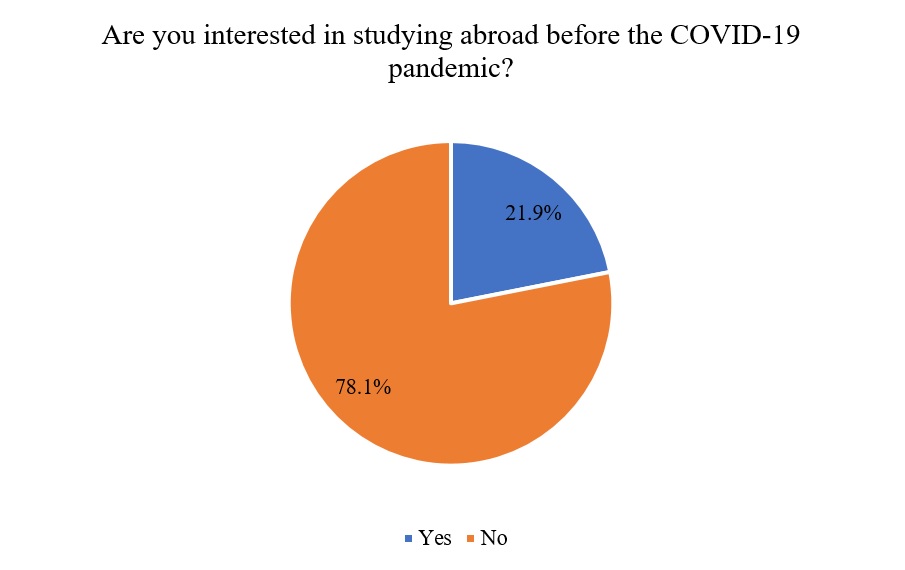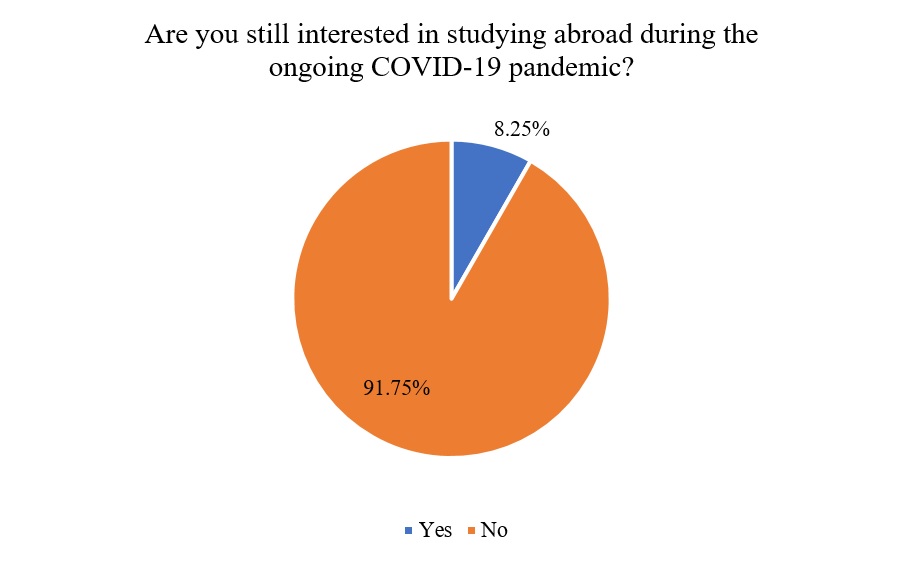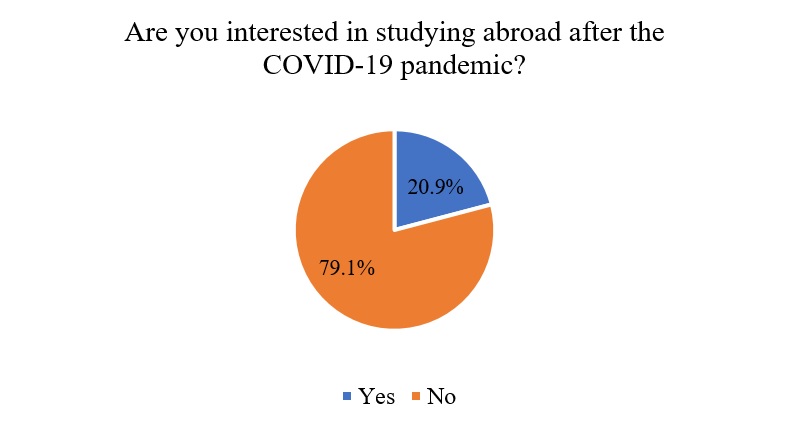LU study finds one in five Mainland Chinese university students are considering postgraduate studies abroad after pandemic
Covid-19 appears to be easing in Mainland China and Hong Kong. In June, the School of Graduate Studies of Lingnan University (LU) conducted a follow-up survey based on last year’s Understanding Hong Kong and Mainland university students’ intentions to study overseas after the COVID-19 crisis, to get to know Mainland university students’ views on pursuing postgraduate studies abroad before, during, and after the pandemic.
The online survey’s 2,036 valid responses show that while 78 per cent (78.1%) of respondents had no interest in studying abroad before the pandemic, nearly 22 per cent (21.9%) would now consider pursuing further education overseas (Figure 1). The top five most popular destinations (more than one may be selected) are the US (50.8%), the UK (45.2%), Japan (19.1%), Canada (16.9%) and Germany (14.4%). Hong Kong was ranked 8th (11%), behind France and Australia (Figure 6). The five least-preferred study destinations are Poland (0.5%), Taiwan (1.1%), Malaysia (2.7%), Macau (3.4%), and New Zealand (6.3%).
When asked whether the global pandemic will affect their intention to pursue further degrees abroad, over 90 per cent (91.75%) of respondents showed no interest in studying abroad (Figure 2). The top three push factors are “my parents would be concerned about my safety and health during the pandemic if I were studying abroad” (85.2%), “I myself would be worried about my safety and health during the pandemic” (84.2%), and “I am afraid I would not be able to get home during the pandemic” (81.4%) (Figure 3).
For respondents (8.25%) wishing to pursue postgraduate degrees abroad, the top three push factors are “the university I prefer can provide a high-quality student learning experience” (80.9%), “the university I prefer has a strong international reputation” (80.4%), and “a foreign university degree will help me to stand out in the fiercely competitive job market” (72.1%) (Figure 4). The top five most popular destinations are the UK (42.3%), the US (41.1%), Canada (23.2%), Japan (20.8%), Germany (17.3%), and France (17.3%). Hong Kong was ranked 6th (16.1%) (Figure 6). The five least-preferred study destinations are Poland (3%), Taiwan (4.2%), Macau (4.2%), Malaysia (4.8%), Italy (7.1%), and New Zealand (7.1%).
More than 20 per cent (20.9%) of respondents would consider studying abroad when the pandemic ends (Figure 5). The top five most popular destinations are the US (45.5%), the UK (43.7%), Japan (23.9%), Canada (21.6%), and Germany (20.2%). Hong Kong came 9th (13.9%), behind France, Australia and Singapore. Again, Poland (2.1%), Malaysia (3.3%), Taiwan (4%), Macau (5.9%), New Zealand (9.4%), and Italy (9.4%) are the five least-preferred study destinations.
Prof Joshua Mok Ka-ho, Vice-President of LU, who led the study, said that no significant difference was found in students’ plans to study overseas before, during, or after the pandemic. East Asian countries and regions including Japan, Singapore, South Korea, and Hong Kong, however, do have more opportunities to recruit international students in these challenging times. For example, 16 per cent (16.1%) of respondents selected Hong Kong as a destination for further studies while the pandemic continues, and nearly 14 per cent (13.9%) said that they plan to pursue postgraduate studies in Hong Kong after the pandemic, which is comparable to Australia and Singapore.
Prof Mok added that universities’ achievements in research and internationalisation may become a key consideration in recruiting students from the Mainland. The encouraging results and performance of local universities in the latest international rankings and the Research Assessment Exercise (RAE) 2020 will attract more students wishing to pursue their postgraduate programmes abroad to Hong Kong.
Figure 1.
Percentage of respondents who are interested in studying abroad before the COVID-19 pandemic

Figure 2.
Percentage of respondents who areinterested in studying abroad during the COVID-19 pandemic?

Figure 3. Reasons for not studying abroad during the COVID-19 pandemic
|
|
Strongly disagree |
Disagree |
No strong opinion |
Agree |
Strongly agree |
|
1. I was never interested in studying abroad |
8% |
13.1% |
11.5% |
29.5% |
37.9% |
|
2. Growing anti-Chinese sentiment in Western countries has disrupted my plans to study overseas |
6.9% |
10% |
23.9% |
36.7% |
22.5% |
|
3. The tensions between China and the West make me worry about studying abroad |
4.9% |
10.4% |
24.3% |
36.8% |
23.7% |
|
4. Due to travel or visa restrictions, I cannot attend face-to-face classes in foreign countries |
12.4% |
21.9% |
32.9% |
22.6% |
10.2% |
|
5. I have to pay full tuition fees for more than just online classes |
6.1% |
15.7% |
24.6% |
33.1% |
20.5% |
|
6. I worry about my safety and health during the pandemic |
2.5% |
3.9% |
9.4% |
35.2% |
49% |
|
7. My parents are concerned about my safety and health during the pandemic |
1.7% |
3.3% |
9.9% |
35.6% |
49.6% |
|
8. I am afraid I will not be able to get home during the pandemic, due to travel restrictions and quarantine requirements |
2.1% |
3.6% |
12.8% |
40.1% |
41.3% |
|
9. Due to poor management of the pandemic in the UK, the US, and elsewhere, I worry that people in these countries may be hostile to students who return home |
3.9% |
10.8% |
26.1% |
33.8% |
25.4% |
Figure 4. Reasons for studying abroad during the COVID-19 pandemic
|
|
Strongly disagree |
Disagree |
No strong opinion |
Agree |
Strongly agree |
|
1. The university I prefer has a strong international reputation |
1.8% |
3% |
14.9% |
56% |
24.4% |
|
2. The university I prefer provides a high-quality student learning experience |
1.2% |
5.4% |
12.5% |
47% |
33.9% |
|
3. The university is close to China, so it would be easy for me to get home |
6% |
22% |
32.7% |
25.6% |
13.7% |
|
4. The outbreak where I plan to study is under control |
4.8% |
20.2% |
32.1% |
32.7% |
10.1% |
|
5. A foreign university degree helps me stand out in the fiercely competitive job market |
0% |
5.4% |
22.6% |
41.1% |
31% |
|
6. Social security cover for students of the this university is good, so my personal safety can be guaranteed |
1.8% |
10.7% |
37.5% |
30.4% |
19.6% |
|
7. The tuition fees and living expenses at this university are relatively low |
8.9% |
23.8% |
32.1% |
25% |
10.1% |
Figure 5.
Percentage of respondents who are interested in studying abroad after the COVID-19 pandemic

Figure 6.
Preferred study destinations before, during and after the COVID-19 pandemic
|
Preferred study destinations before the COVID-19 pandemic |
Preferred study destinations during the ongoing pandemic |
Preferred study destinations after the COVID-19 pandemic |
|
1. United States (50.8%) |
1. United Kingdom (42.3%) |
1. United States (45.5%) |
|
2. United Kingdom (45.2%) |
2. United States (41.1%) |
2. United Kingdom (43.7%) |
|
3. Japan (19.1%) |
3. Canada (23.2%) |
3. Japan (23.9%) |
|
4. Canada (16.9%) |
4. Japan (20.8%) |
4. Canada (21.6%) |
|
5. Germany (14.4%) |
5. Germany (17.3%) |
5. Germany (20.2%) |
|
6. France (13.3%) |
5. France (17.3%) |
6. France (19.7%) |
|
7. Australia (11.9%) |
6. Hong Kong (16.1%) |
7. Australia (15%) |
|
8. Hong Kong (11%) |
7. Singapore (15.5%) |
8. Singapore (14.1%) |
|
8. South Korea (11%) |
8. Australia (13.7%) |
9. Hong Kong (13.9%) |
|
9. Singapore (9.4%) |
9. South Korea (9.5%) |
9. South Korea (13.9%) |
|
10. Italy (7%) |
10. New Zealand (8.9%) |
10. Italy (9.4%) |
|
11. New Zealand (6.3%) |
11. Italy (7.1%) |
10. New Zealand (9.4%) |
|
12. Macau (3.4%) |
12. Malaysia (4.8%) |
11. Macau (5.9%) |
|
13. Malaysia (2.7%) |
13. Taiwan (4.2%) |
12. Taiwan (4%) |
|
14. Taiwan (1.1%) |
13. Macau (4.2%) |
13. Malaysia (3.3%) |
|
15. Poland (0.5%) |
14. Poland (3%) |
14. Poland (2.1%) |
|
16. Others (4%) |
15. Others (3.6%) |
15. Others |

